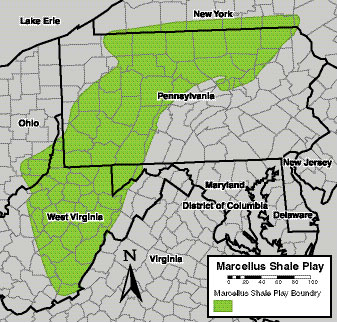Marcellus Represents Opportunity, Challenges
Washington, PA Observer-Reporter
8 November 2009
Exploration in the Marcellus Shale strata began in October 2004 in
Chartiers Township when Range Resources Corp. drilled an experimental
well. When a second well produced even more favorable results, drilling
for natural gas gradually ramped up into what is today a $5 billion
industry in Southwestern Pennsylvania.
In addition to Range, other drillers such as Chesapeake Energy Corp.,
Atlas Energy and CNX Gas are all players in the region, and company
officials, backed up by some geologic studies from Penn State
University predict that the massive shale strata, which stretches from
New York State across Pennsylvania and into Ohio and West Virginia, has
the potential to supply U.S. energy demand for the next decade.
Along with the optimism is concern about the environmental impact the
drilling will have. Early-stage drilling projects bring complaints of
noise, dirt and excessive truck traffic until the sites are reclaimed.
Worries have also focused on the projects’ impact on water supplies,
since companies require millions of gallons of water to fracture the
dense shale to release the gas.
As the Marcellus Shale story continues to unfold, it remains to be seen
if economic opportunity in the form of increasing employment in the gas
fields and royalty and lease payments to land owners will coexist with
the environmental challenges the drilling imposes on the land.

Some recent developments related to Marcellus Shale drilling activity:
Oct. 5-8 – Representatives of J. Howard Bass & Associates, a
Georgetown, Texas, leasing company talk with hundreds of residents from
the Canonsburg area at the Hilton Garden Inn about the possibility of
drilling into the Marcellus Shale to extract natural gas from beneath
their properties. The company, which forms partnerships with drilling
companies to focus on extracting gas from more densely populated areas,
held a similar four-day set of meetings with hundreds of Washington
area residents in September.
Oct. 12 – Cecil Township supervisors hold a public hearing regarding
Range Resources’ possible plans to drill for gas off state Route 980.
Supervisors say later that they are likely to vote in December on an
ordinance governing gas and oil drilling in the township, noting that
while some residents look forward to the possibility of receiving money
for the mineral rights to their property, other are expressing concern
over the environmental impact.
Oct. 19 – Range Resources, one of the most active exploration companies
in the Marcellus Shale strata with more than 900,000 acres leased,
announces it is recycling flowback water from its drilling operations.
The company said it is reusing all of the water it recovers, filtering
solids from it and combining it with fresh water to use in newly
drilled wells. The company said it is saving millions of gallons of
water, cutting drilling costs, water use and truck traffic.
Oct. 22 – The newly formed, bipartisan Congressional Natural Gas Caucus
holds its first hearing, with co-chairmen Tim Murphy, R-Upper St.
Clair, and Dan Boren, D-Okla. Murphy said later the caucus has more
than 30 members and is focusing on disseminating information about the
abundant supplies of natural gas in the U.S. and their potential to put
America on a path to energy independence.
Oct. 28 – The state Department of Environmental Protection announces an
increase in permit application fees for all traditional vertical,
non-Marcellus Shale and natural gas wells drilled in Pennsylvania to
cover the cost of the agency’s permitting and enforcement work for all
types of gas drilling. It was the first increase in vertical well
application fees since 1984. The increase followed an April increase in
permitting fees for Marcellus Shale and non-vertical wells.
